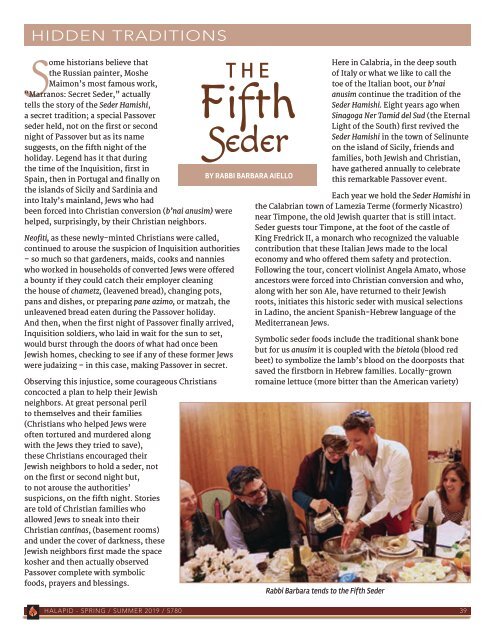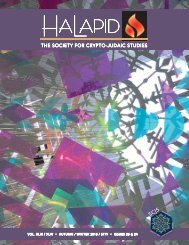HaLapid-Spring Summer 2019
Create successful ePaper yourself
Turn your PDF publications into a flip-book with our unique Google optimized e-Paper software.
hidden traditions<br />
Some historians believe that<br />
the Russian painter, Moshe<br />
Maimon’s most famous work,<br />
“Marranos: Secret Seder,” actually<br />
tells the story of the Seder Hamishi,<br />
a secret tradition; a special Passover<br />
seder held, not on the first or second<br />
night of Passover but as its name<br />
suggests, on the fifth night of the<br />
holiday. Legend has it that during<br />
the time of the Inquisition, first in<br />
Spain, then in Portugal and finally on<br />
the islands of Sicily and Sardinia and<br />
into Italy’s mainland, Jews who had<br />
been forced into Christian conversion (b’nai anusim) were<br />
helped, surprisingly, by their Christian neighbors.<br />
Neofiti, as these newly-minted Christians were called,<br />
continued to arouse the suspicion of Inquisition authorities<br />
– so much so that gardeners, maids, cooks and nannies<br />
who worked in households of converted Jews were offered<br />
a bounty if they could catch their employer cleaning<br />
the house of chametz, (leavened bread), changing pots,<br />
pans and dishes, or preparing pane azimo, or matzah, the<br />
unleavened bread eaten during the Passover holiday.<br />
And then, when the first night of Passover finally arrived,<br />
Inquisition soldiers, who laid in wait for the sun to set,<br />
would burst through the doors of what had once been<br />
Jewish homes, checking to see if any of these former Jews<br />
were judaizing – in this case, making Passover in secret.<br />
Observing this injustice, some courageous Christians<br />
concocted a plan to help their Jewish<br />
neighbors. At great personal peril<br />
to themselves and their families<br />
(Christians who helped Jews were<br />
often tortured and murdered along<br />
with the Jews they tried to save),<br />
these Christians encouraged their<br />
Jewish neighbors to hold a seder, not<br />
on the first or second night but,<br />
to not arouse the authorities’<br />
suspicions, on the fifth night. Stories<br />
are told of Christian families who<br />
allowed Jews to sneak into their<br />
Christian cantinas, (basement rooms)<br />
and under the cover of darkness, these<br />
Jewish neighbors first made the space<br />
kosher and then actually observed<br />
Passover complete with symbolic<br />
foods, prayers and blessings.<br />
The<br />
Fifth<br />
Seder<br />
by rabbi barbara aiello<br />
Here in Calabria, in the deep south<br />
of Italy or what we like to call the<br />
toe of the Italian boot, our b’nai<br />
anusim continue the tradition of the<br />
Seder Hamishi. Eight years ago when<br />
Sinagoga Ner Tamid del Sud (the Eternal<br />
Light of the South) first revived the<br />
Seder Hamishi in the town of Selinunte<br />
on the island of Sicily, friends and<br />
families, both Jewish and Christian,<br />
have gathered annually to celebrate<br />
this remarkable Passover event.<br />
Each year we hold the Seder Hamishi in<br />
the Calabrian town of Lamezia Terme (formerly Nicastro)<br />
near Timpone, the old Jewish quarter that is still intact.<br />
Seder guests tour Timpone, at the foot of the castle of<br />
King Fredrick II, a monarch who recognized the valuable<br />
contribution that these Italian Jews made to the local<br />
economy and who offered them safety and protection.<br />
Following the tour, concert violinist Angela Amato, whose<br />
ancestors were forced into Christian conversion and who,<br />
along with her son Ale, have returned to their Jewish<br />
roots, initiates this historic seder with musical selections<br />
in Ladino, the ancient Spanish-Hebrew language of the<br />
Mediterranean Jews.<br />
Symbolic seder foods include the traditional shank bone<br />
but for us anusim it is coupled with the bietola (blood red<br />
beet) to symbolize the lamb’s blood on the doorposts that<br />
saved the firstborn in Hebrew families. Locally-grown<br />
romaine lettuce (more bitter than the American variety)<br />
Rabbi Barbara tends to the Fifth Seder<br />
<strong>HaLapid</strong> - SPRING / SUMMER <strong>2019</strong> / 5780 39



